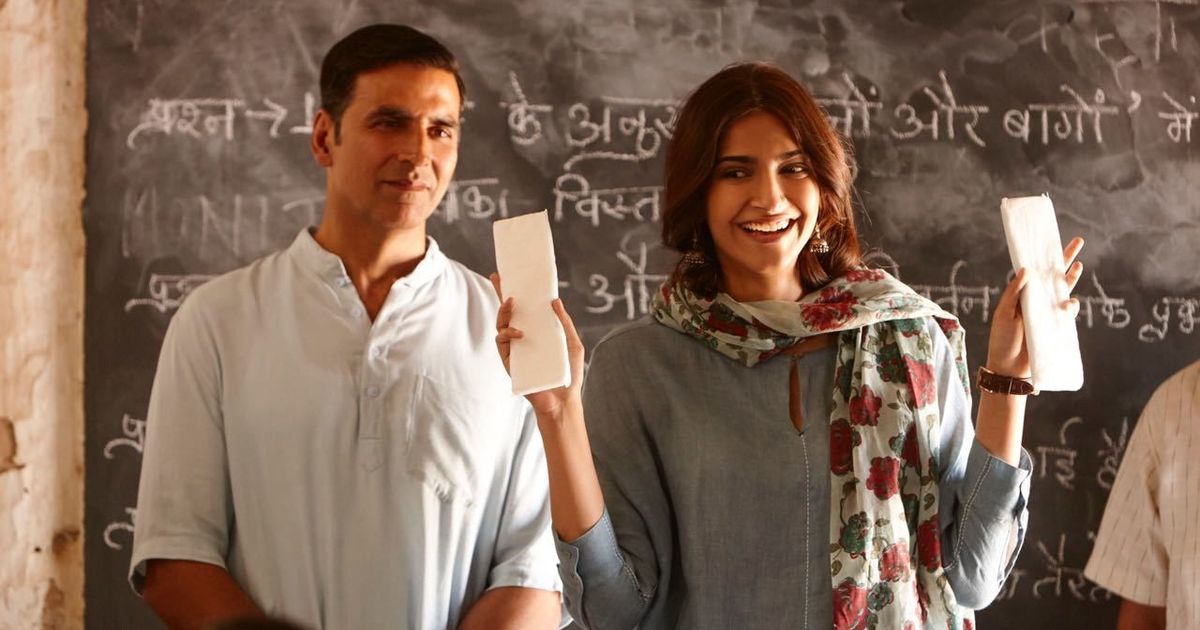

Akshay Kumar and Sonam Kapoor in Pad Man | Mrs Funnybones Movies
Countless Hindi films promise one thing but deliver another. Look behind the poster and beyond the trailer and all you see are insignificant storms and fury.
R Balki’s movies cannot be accused of cranking up the hype. They neatly fit one-line briefs with enough substance to justify their length. Cheeni Kum: curmudgeonly older cook falls for much younger woman, sending her father into shock. Paa: Amitabh Bachchan plays a character stricken with progeria, with his real-life son Abhishek Bachchan playing his father. Shamitabh: Amitabh Bachchan becomes the voice of a mute aspiring actor. Ki & Ka: the wife works while spouse becomes a house husband.
The finger-on-pulse canniness that the advertising professional brings to his movies is very evident in Pad Man. Balki’s latest movie, based on Coimbatore social activist Arunachalam Muruganantham, is exactly what the trailer promised: untrained man makes low-cost sanitary pads for his wife, sparking a revolution. In trying to free his wife Gayatri (Radhika Apte) from the possibility of infection, Laxmikant Chauhan (Akshay Kumar) becomes the living symbol of jugaad economics, a poster boy for Make in India, and a shining example of the belief expressed in the movie that “India should be seen…as a country of one billion minds.”
Laxmikant is outraged that Gayatri uses a dirty cloth instead of a sanitary pad and is confined to a corner of the house for the duration of her menstrual cycle. His growing obsession with sanitary napkins and commonsensical experiments to create an affordable alternative horrify Gayatri and his extended family. “Why is your life stuck between a woman’s legs?” Gayatri asks her husband in between tearing up and burying her face into the folds of her sari.
Laxmikant’s war might be waged in the name of his tradition-bound and submissive wife, but it is another woman who nudges him towards success. Business school graduate Pari (Sonam Kapoor) becomes Laxmikant’s champion, sales and marketing head, and bridge to the world beyond the shack where he churns out his affordable pads. Pari falls for Laxmikant – he is, after all, played by one of Bollywood’s most affable movie stars. For all its emphasis on the spirit of homegrown entrepreneurship, it is love that fuels the engines of creativity in Pad Man.
Play
This isn’t exactly new territory. Muruganantham has already been the subject of a clutch of documentaries while the small-budget 2017 moviePhullu explored low-cost sanitary pads. Pad Man is more upscale than Phullu and far more engaging, even though, unlike that movie, it focuses less on the stigma attached to menstruation and more on Laxmikant’s efforts.
The 139-minute movie sketches out Laxmikant’s ingenuity in often redundant detail, to the accompaniment of an insistently uplifting background score and contrived soap operatics. It’s eventually a hop, skip and jump between the first disastrous attempts to manufacture pads in the backyard and recognition from the Indian Institute of Technology and the United Nations as well as a Padma Shri.
Laxmikant’s victory is more easily won than 2017’s Toilet: Ek Prem Katha. In that movie too, a husband battled entrenched orthodoxy (this time relating to indoor latrines) to win back his wife. Like Pad Man, Toilet: Ek Prem Katha has an unmistakable public-service announcement quality, but it explores the cost of tackling social taboos with greater depth and perspicacity.
Pad Man tries to offset its intrinsic earnestness by adopting fast cutting and endless action, but the complexity of Laxmikant’s battle against stigma and prejudice is lost in the process. Manufactured momentum doesn’t often translate into momentousness.
The common element between Toilet: Ek Prem Katha and Pad Man is the star who depicts the socially conscious and self-sacrificing feminist hero. Akshay Kumar’s recent career turn towards message-oriented movies has seen him in the mould of a reformer. Despite the dull purposefulness of some of his recent roles, the movies manage to work because of Kumar’s ability to justify mansplaining as a duty towards womankind. (Sample Laxmikantism: “How can a man call himself a man if he cannot protect women?”)
Balki makes Kumar work hard to distinguish Laxmikant from the hero of Toilet: Ek Prem Katha. Kumar’s astutely judged Laxmikant is assertive without being aggressive, and he convincingly portrays a bit of the madness and lack of ego that possessed Arunachalam Muruganantham to go where few men have gone before.
A more refined actor might have conveyed Laxmikant’s obsession better, but Akshay Kumar’s role here is to convince sceptics. What Kumar lacks in acting skills, he makes up for with his conviction and warmth. Whenever he is in the frame – which is all the time – Pad Man loses some of its preachiness. The sequence in which Laxmikant delivers a lecture at the United Nations in broken English is dragged on endlessly, but Kumar’s geniality carries the moment through.
The most radical aspect of Pad Man is the fact that the movie exists in the first place. It is rare, indeed unthinkable, to imagine an A-list Bollywood production about a subject like menstruation. Pad Man comes with its own applause track, with lots of sequences that attempt to prod viewers into mentally bursting out of their seats in amazement at Laxmikant’s audacity. In reality, the movie contains no astonishment or surprise. But in proceeding exactly as depicted by the trailer, Pad Man proves that sometimes, the message is far more important than the way in which it has been communicated.


